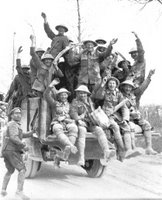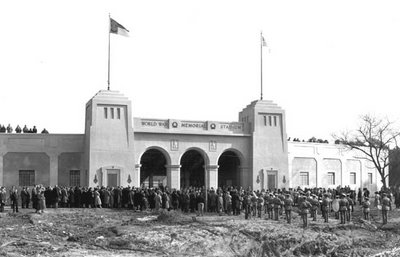This afternoon, after I finished teaching my (sparsely-attended, pre-Thanksgiving) Ancient Cosmology class about the atomic, materialist philosophy of Titus Lucretius Carus, I couldn't help but have a plus ça change feeling when I came across two articles on the web as I ate my lunch.
The first of them wins the good headline of the day award ("Think Tank Will Promote Thinking"), and it starts out like this:
… a group of prominent scientists and advocates of strict church-state separation yesterday announced formation of a Washington think tank designed to promote "rationalism" as the basis of public policy …. The brainchild of Paul Kurtz, founder of the Center for Inquiry-Transnational, the small public policy office will lobby and sometimes litigate on behalf of science-based decision making and against religion in government affairs.
Then there was this from the Times, in a story about a conference on science and religion::
Dr. Weinberg, who famously wrote toward the end of his 1977 book on cosmology, “The First Three Minutes,” that “the more the universe seems comprehensible, the more it also seems pointless,” went a step further: “Anything that we scientists can do to weaken the hold of religion should be done and may in the end be our greatest contribution to civilization.”
People tend to believe (I think) that this kind of passionate commitment to rational empiricism, in opposition to religious thought, is something new. But it's not. Here's Lucretius (in my own rather free and abridged translation), writing in the 1st century BC::
When human life lay sordidly prostrate over all the earth, oppressed by religion's heavy weight – religion, which reared its head with a horrifying face, glowering from the heavens at mortals – a Greek man, a mortal, dared to raise his eyes and oppose it, and neither the reports of angry gods, nor threatened lightning bolts and thunder could stop him. Instead, they pushed him on to greater efforts, and the power of his supple mind conquered the secrets of the universe … and so religion in turn is crushed beneath his feet, and in his victory he raises us to the stars. (De Rerum Natura I.62-79):
Lucretius was writing about his hero Epicurus, whose materialist philosophy is remarkably similar in some ways to that of the people quoted above, and of others like them such as
Daniel Dennett and
Richard Dawkins.
Like the modern materialists, Lucretius was passionately dedicated to spreading the truth of his philosophy, and to explaining how it explains
everything. Also, like the modern materialists, he was not very successful at persuading most people that he was right, and that was probably a source of great frustration to him.
St. Jerome reports that Lucretius eventually killed himself (though the veracity of that information is doubtful; Jerome, the translator of the Bible from Greek and Hebrew into Latin, was quite hostile to pagan atheistic materialists).
What's interesting to me, though, is that I think Lucretius understood the ethical implications of a purely materialist philosophy somewhat better than his modern progeny do. Lucretius's Epicurean ethics told him that pleasure was the highest good that a human living in such a cosmos could attain to, and true Epicureans retreated from the world of politics and public life, knowing that those pursuits are not only pointless but inherently painful.
The idea that those who know about the physical processes and laws governing the universe should be able to impart any policy advice about war and peace, wealth and poverty, or any of those other transitory states of affairs that arise from the random interactions of atoms in the great void, would be purely laughable to Lucretius.
And I wonder: if Dr. Weinberg is correct about the pointlessness of the universe, what is the meaning of a concept like a "great contribution to civilization?" In an infinite, material universe, the activities of human beings during a minute interval of time, on the surface of an infinitesimally small bit of cosmic debris, amount to precisely nothing. So if Dr. Weinberg's position is something like, "life and the universe
are essentially pointless, but nevertheless you need to get on board with
my meaningless program for civilization," it shouldn't be very surprising to him if a lot of people take a pass.
It also doesn't help the scientists' case that some of the great public policy disasters of the 20th century, like "scientific" Marxism, ended up killing more people than a thousand Spanish Inquisitions. Other, "science"-based programs like
eugenics, simply make us shudder and avert our eyes.
It's not that I'm anti-science. I LOVE science. I'm enthralled with modern cosmology, and loved studying physics and biology in school. And I think that the government should listen closely to the best scientists it can find.
But what does a scientist,
qua scientist, have to say about the value of free speech, or the right to a trial by one's peers, or the right to bear arms, or the right of assembly, or the right to practice my religion freely?
Precisely nothing.
And if Richard Dawkins were in charge, I think he'd take that last one away.















